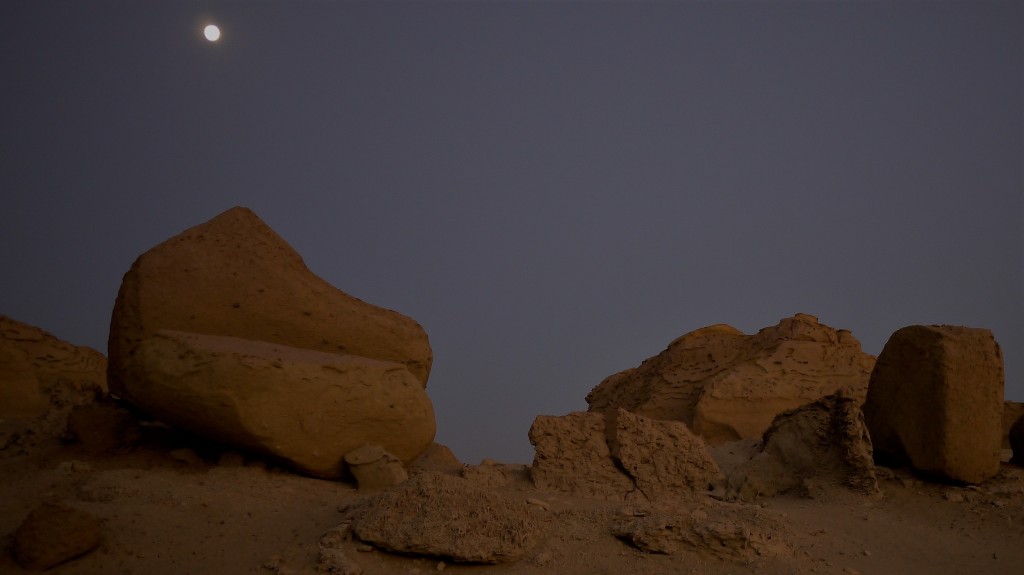Camping in the desert, I have the opportunity to watch the sky and see the stars at night. In the city one could do the same, but clouds often cover the sky and there is always a lot of light pollution and earthly affairs usually make one forget to look upwards. In the desert I see the sky as Abraham must have seen it when the Lord said to him: “Look toward heaven and count the stars, if you are able to count them” (Gen. 15:5 NRSV).
Basil the Great
Watching the sky, I feel very small. I stand on a small planet in an immense universe. I envy past generations who could at least believe that the earth is the center of the universe. Basil the Great (ca. 329–379) mentioned the view of some early scientists that it is not only a fact but also a necessity that the earth occupies this central position. He himself piously added:
If there is anything in this system which might appear probable to you, keep your admiration for the source of such perfect order, for the wisdom of God. Grand phenomena do not strike us the less when we have discovered something of their wonderful mechanism. Is it otherwise here? At all events let us prefer the simplicity of faith to the demonstrations of reason.
By now we know that it is otherwise and that the early scientists were wrong. By now we know that not even the sun is at the center. By now we know that we are somewhere in the back of beyond of the universe.
Calvin
I recollect the verse “God made the two great lights—the greater light to rule the day and the lesser light to rule the night—and the stars” (Gen. 1:16) and remember that Calvin commented on it:
Moses makes two great luminaries; but astronomers prove, by conclusive reasons that the star of Saturn, which on account of its great distance, appears the least of all, is greater than the moon. . . . This study is not to be reprobated, nor this science to be condemned, because some frantic persons are wont boldly to reject whatever is unknown to them. For astronomy is not only pleasant, but also very useful to be known: it cannot be denied that this art unfolds the admirable wisdom of God. Wherefore, as ingenious men are to be honoured who have expended useful labour on this subject, so they who have leisure and capacity ought not to neglect this kind of exercise.
For Basil and Calvin, it was easy to appreciate the sciences because they experienced them as a stimulus to observe the universe also with a religious eye and to perceive God’s wisdom. However, those who have followed Calvin’s exhortation have discovered things that do not display divine wisdom. For what is the wisdom of the fact that we live on such a small planet in the back of beyond of the universe?
Brakel
Are Christians not very superficial and have they ever really watched the sky when they say that the Copernican worldview does not constitute a challenge for their faith at all? Was the often ridiculed Wilhelmus à Brakel (1635–1711) in fact not much better aware of what was at stake when he said:
All what God says, also about natural things, is true; God says that the world stands still and motionless and that the sun goes around, and thus this is a certain and unarguable truth.
That . . . the sun would stand motionless and that the earth would turn, is a fabrication of people whose heads turn too much. We believe Holy Scripture.
Paul
Or is it possible that God wants to have to do with a small planet in the back of beyond of the universe? Does the cosmos exactly in this way display divine wisdom? I remember what Paul the Apostle said:
For God’s foolishness is wiser than human wisdom, and God’s weakness is stronger than human strength. . . . God chose what is foolish in the world to shame the wise; God chose what is weak in the world to shame the strong; God chose what is low and despised in the world, things that are not, to reduce to nothing things that are, so that no one might boast in the presence of God. (1 Cor. 1:25, 27–29 NSRV)
Can we now see this principle of divine wisdom at a cosmic scale too? Can we now see a deeper dimension of divine wisdom than Basil and Calvin could?
It is getting cold and my neck has become stiff from looking upwards. If I want to be able to turn my head tomorrow, I will have to sleep now. I go into my tent.
Psalm 8
Just when I close my eyes, a Psalm comes into my mind: “When I look at your heavens, the work of your fingers, the moon and the stars, which you have set in place, what is man that you are mindful of him, and the son of man that you care for him?” Was that feeling of littleness, that feeling of being an accident in a vast universe, really something caused by our present-day knowledge of the cosmos? Did the Psalmist not feel the same some millennia ago? And still, he dared to continue: “Yet you have made him a little lower than the heavenly beings and crowned him with glory and honor.” I realize: man is an accident in a vast universe, yet a glorious accident. I breathe out: “O Lord, our Lord, how majestic is your name in all the earth!” (Ps. 8:3–4, 5, 9 ESV).
Then I sleep.
Note

This post has been adapted from section 6.4 of Willem J. de Wit, On the Way to the Living God: A Cathartic Reading of Herman Bavinck and an Invitation to Overcome the Plausibility Crisis of Christianity (Amsterdam: VU University Press, 2011).
